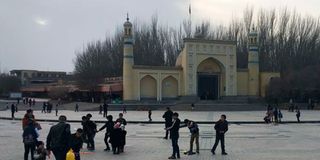Amnesty International: China still using forced camps to punish minorities

This photo taken on February 18, 2018 shows children playing outside the Id-kah mosque in Kashgar, in China's western Xinjiang region. The predominantly Uyghur area in China’s far western Xinjiang region has become one of the most policed places on earth.
What you need to know:
- In a report released on Saturday, Amnesty International says it found “a dystopian hellscape” in the government policy towards religious minorities in Xinjiang.
Global rights watchdog Amnesty International is raising new allegations of violations, forced labour by the Chinese government on religious minorities in Xinjiang, north-western part of the country.
In a report released on Saturday, Amnesty International says it found “a dystopian hellscape” in the government policy towards religious minorities in Xinjiang, saying internment camps were being used to force local communities to abandon their beliefs, and sometimes work without rest or sleep.
The report, compiled after what AI said was interviews with 55 former detainees in Xinjiang, also lists people said to have been ‘disappeared’ under China’s counter-terrorism programme launched in the region to combat extremism.
Beijing immediately rejected the accusations as fabrications. Recently, it took a number of foreign diplomats to the region to see how the programme works. And officials argue Xinjiang is safe now.
Over one million affected
But Amnesty said Beijing has used the programme to mete out collective punishment on religious minorities, forcing as many as one million into internment camps.
“Far from a legitimate response to the purported terrorist threat, the government’s campaign evinces a clear intent to target parts of Xinjiang’s population collectively on the basis of religion and ethnicity and to use severe violence and intimidation to root out Islamic religious beliefs and Turkic Muslim ethno-cultural practices,” the report, Like We were enemies in a war, said.
“These violations are carried out in such a widespread and systematic manner that they are now an inexorable aspect of daily life for millions of members of predominantly Muslim ethnic minorities in Xinjiang.”
Formally known as Xinjiang Uyghur Autonomous Region, it is one of the world’s biggest producers of polysilicon material for making solar panels, accounting for a third of the global production. But it has also been in the folklore of human rights organisations ever since China launched a campaign against violent extremism there.
Amnesty International says the internment camps, known locally as re-education centres, are a part of “a larger campaign of subjugation and forced assimilation of ethnic minorities in Xinjiang.”
Questionable policies
It says ethnic communities like the Uyghurs, Uyghurs, Kazakhs, Hui, Kyrgyz, Uzbeks and Tajiks; mainly Muslim ethnic minorities in China’s Xinjiang face systematic state-organised mass imprisonment, torture and persecution amounting to crimes against humanity, Amnesty International said as it launched a new report and campaign today.
“The government of China has enacted other far-reaching policies that severely restrict the behavior of Muslims in Xinjiang.
“These policies violate multiple human rights, including the rights to liberty and security of person; to privacy; to freedom of movement; to opinion and expression; to thought, conscience, religion, and belief; to participate in cultural life; and to equality and non-discrimination.”
Some of those interviewed claimed they had been detained for contacting someone abroad, hanging religious photos in the houses or speaking a local dialect.
On Sunday, China accused Amnesty of spreading disinformation.
“This organization, wearing tinted glasses, has been misleading the public and spreading lies and rumors about Xinjiang,” said Wang Wenbin, Spokesperson for the Chinese Foreign Ministry.
“Its so-called report is like adding one more page to its "record of lies". We urge the relevant organisation to abandon its persistent prejudice against China, stop fabricating and spreading disinformation and look at relevant issues from an objective and just perspective.”
G7 discussions
The 160-page document prepared by Amnesty’s Crisis Response Team, however, adds more pressure on Beijing to come clean on its programme on Xinjiang.
At the G7 meeting in Cornwall, leaders of the US, UK and six other rich economies released what they called Build Back Better World programme. And they identified china’s alleged forced labour in Xinjiang as among the human rights issues that needs to be addressed.
“The international community must speak out and act in unison to end this abomination, once and for all. The UN must establish and urgently dispatch an independent investigative mechanism with a view to bringing those suspected of responsibility for crimes under international law to account,” said Agnès Callamard, Amnesty International’s Secretary General.
“China must immediately dismantle the internment camps, release the people arbitrarily detained in them and in prisons, and end the systematic attacks against Muslims in Xinjiang.”
Beijing has resisted the internationalisation of the issues in Xinjiang, which it argues is its domestic matter. But the region’s importance to the global renewable energy value chain has seen various lobbies push for a boycott.
Last month, US Special Envoy on Climate Change John Kerry indicated Washington could impose sanctions if it found forced labour had been used in the production of polysilicon material used to make solar panels.





